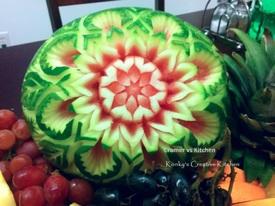cooked and dry weight
Options

ieva015
Posts: 93 Member
this is really stupid question, but i'm really confused
first of all, i can't find anywhere how much calories have uncooked bulgur wheat
on the package, it says that 30 g of uncooked bulgur weights aproximatelly 84g when cooked
i cooked exactly 90g of bulgur, and when i weighted it, is said 324 grams instead of 252 :noway: ( i followed the instructions carefully and used electronic scale)
now, which weight do i put in my food diary to get the right calories? :indifferent:
thank you!
first of all, i can't find anywhere how much calories have uncooked bulgur wheat
on the package, it says that 30 g of uncooked bulgur weights aproximatelly 84g when cooked
i cooked exactly 90g of bulgur, and when i weighted it, is said 324 grams instead of 252 :noway: ( i followed the instructions carefully and used electronic scale)
now, which weight do i put in my food diary to get the right calories? :indifferent:
thank you!
0
Replies
-
Please tell me you are trying to add some weight to you... youre rail thin0
-
Use the dry weight! Cooking only adds water, and it can depend on a lot of things how much water the product takes in. For example, with pasta it depends on how long you cook it. So check how many calories it has when uncooked and use the dry weight to calculate calories. Water doesn't add cals.
 0
0 -
When cooking anything (such as pasta, etc) I measure it dry because you can't really tell how much water was absorbed by it. Most of what I cook shows the nutrition facts as dry. That's what I would go by if you have the nutritional info for dry.0
-
I personally would go with the dry weight because things like that can absorb more water/less water depending on how long you cook it.0
-
agreed..same with meat and stuff..i always use pre cooked weight so that i can be safe just incase, as the fat and stuff cook our of it..0
-
thank you girls
 :flowerforyou: 0
:flowerforyou: 0 -
Always use dry/raw weight when calculating calories. It is impossible to tell what a dry food like bulger or pasta, or a raw product like meat, fruit, or vegetables, will weigh after being cooked. There are too many variables.
You can take the same dry measure of a food, cook it the same way each time, and end up with a different final weight each time, but they will all have the same calories.0 -
Use the dry weight! Cooking only adds water, and it can depend on a lot of things how much water the product takes in. For example, with pasta it depends on how long you cook it. So check how many calories it has when uncooked and use the dry weight to calculate calories. Water doesn't add cals.

Thanks so much for this (and the other posters after you as well that mentioned it)!. I wondered why we were supposed to use dry or pre-prepared weights.0 -
It is very confusing. On the front of a packet of Aborio Rice it says - 75g is 260 calories - but on the back it says that when this is cooked it becomes - 195g and is therefore 350 calories. How do we count it then?0
-
Just be consistent - weigh it dry, use the dry value. Weigh it cooked use the cooked value.It is very confusing. On the front of a packet of Aborio Rice it says - 75g is 260 calories - but on the back it says that when this is cooked it becomes - 195g and is therefore 350 calories. How do we count it then?
Does it really say that 75g becomes 195g and therefore 350 calories, or did you do that bit ? 75g as sold has 260 calories and that doesn't go up by cooking it or wetting it unless you add something.0 -
Was wondering the same thing. It can be really confusing sometimes0
This discussion has been closed.
Categories
- All Categories
- 1.4M Health, Wellness and Goals
- 396.7K Introduce Yourself
- 44.2K Getting Started
- 260.8K Health and Weight Loss
- 176.3K Food and Nutrition
- 47.6K Recipes
- 232.8K Fitness and Exercise
- 450 Sleep, Mindfulness and Overall Wellness
- 6.5K Goal: Maintaining Weight
- 8.7K Goal: Gaining Weight and Body Building
- 153.3K Motivation and Support
- 8.3K Challenges
- 1.3K Debate Club
- 96.5K Chit-Chat
- 2.6K Fun and Games
- 4.5K MyFitnessPal Information
- 16 News and Announcements
- 18 MyFitnessPal Academy
- 1.4K Feature Suggestions and Ideas
- 3.1K MyFitnessPal Tech Support Questions







